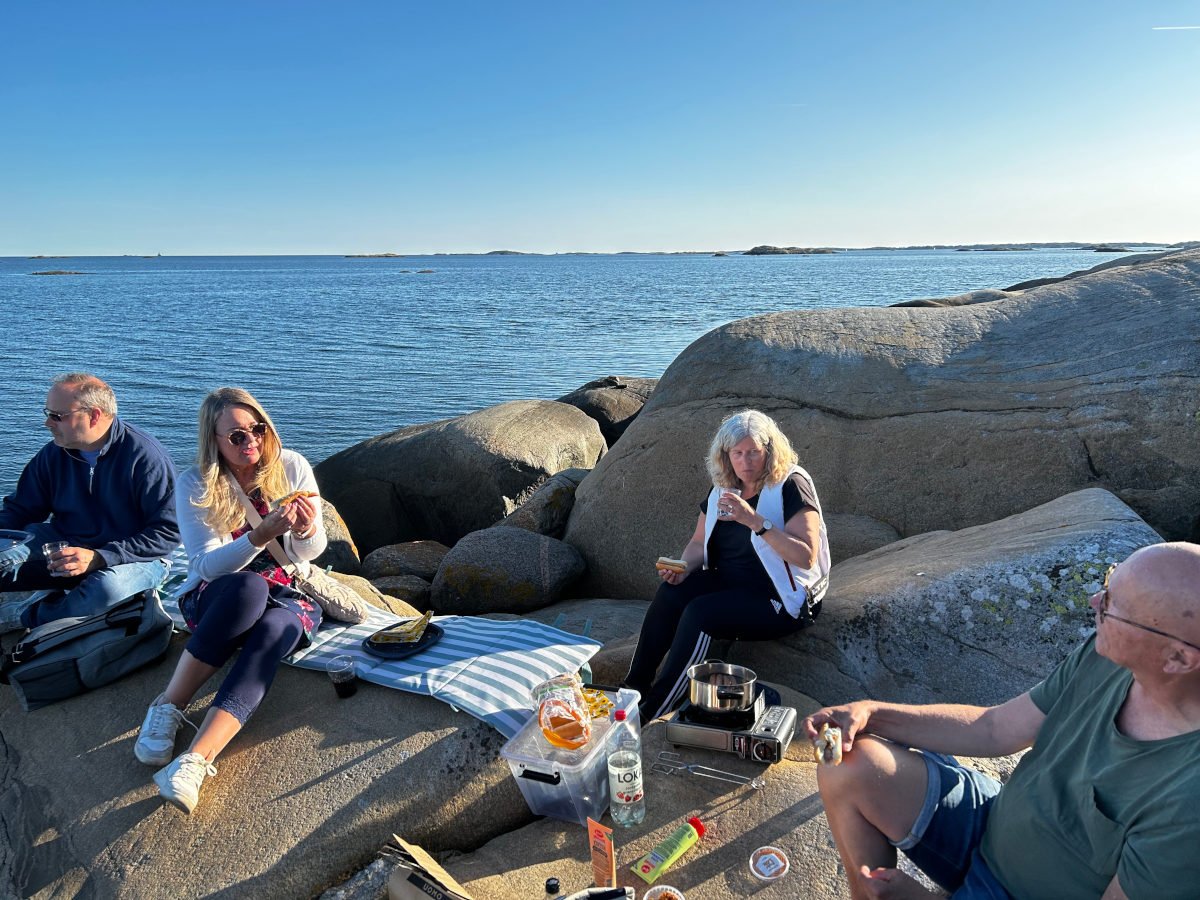If you’re British or French, debate is almost a national sport. People play ‘Devil’s advocate’ (or l’avocat du diable) just to stoke up the passion in the room. If someone loses self control and raises their voice a bit, that’s OK, at least between friends. It’s a sign of engagement, a sign that they care.
You only have to compare the angry jeering in the UK’s Houses of Parliament to the staid Swedish party leader debates on TV, or seminars at Swedish universities with the way UK students are trained to to argue for positions they disagree with. You could also study Sweden’s softly spoken court lawyers with their bombastic, adversarial UK and US equivalents.
Swedes hate to express disagreement and after living here for over a decade, I feel that they don’t, or perhaps can’t, separate intellectual disagreements from actual personal conflict (as I instinctively would as a Brit). For a Swede a disagreement is a disagreement, and therefore unpleasant, no matter what it is about.
There’s also less of a tradition of argument as competitive sport. There are no winners once a debate gets heated. People just feel upset. The Norwegian writer Karl Ove Knausgård describes going to bed after a boozy supper with literary Swedes thinking he’d had a great evening, only to wake to find his hosts feared relations had been irreparably broken.

The positive aspects of all this can be seen in the lower levels of hypocrisy in Swedish national life. A figure like former British Prime Minister Boris Johnson is so steeped in Oxbridge debating culture that he can breezily dash off articles both for and against leaving the European Union. In Sweden, this would be almost unfeasible.
So how should you approach holding discussions with a Swede?
1. Know the consensus
Swedes hate people talking about it, but as a foreigner in Sweden it’s fairly clear that the fabled ‘opinion corridor’, or åsiktskorridoren, is no myth. There is a span of acceptable opinions and people start to feel uncomfortable if you move outside them.
For big topics, it’s quite easy to learn where the boundaries lie.
For the vast majority of Swedes, whether on the left or right, you probably can’t get away with, for example, expressing your admiration of former US President Donald Trump, arguing that it’s bad for children to go to daycare before they’re three, arguing that children don’t need bicycle helmets, or that it’s OK to drink moderate amounts of alcohol when pregnant. For reasons I don’t fully understand, it’s also appears unacceptable to argue that the state alcohol monopoly Systembolaget has a woefully poor selection of wine. At least, no one will agree with you if you do.
As it happens, the corridor can shift. A decade ago, it was absolutely not OK to discuss setting concrete limits for immigration or the ethnicity of criminals. In 2015, that dramatically changed, with politicians of both left and right suddenly competing to tighten up border controls, and the media pumping out stories of sexual harassment by asylum seekers.

‘2. Let the Swede lead
The demand for consensus is not limited to the big political issues, but runs deep into things like house decoration, music taste, food and films. Swedes have a natural instinct for knowing what any group thinks about any topic, and assessing what the bounds of opinion are likely to be. This is tricky for a newcomer to grasp, so the best advice is to let the Swede lead. Wait until you have a good idea about what the people you’re with think before storming in with your own opinions.
3. Expand and reinforce, don’t contradict
Say the discussion gets into what a horrific let-down the last series of Game of Thrones was, and you thought it was well-written, with imaginative plot twists and a satisfying end. Don’t contradict your companions head-on. Instead think of something you also felt was a weakness, or add details and new observations to the discussion of the shortcomings advanced by others in your group.
Conversation in Sweden is about arriving at a richer, more nuanced picture of what it is assumed everyone present agrees to be the case, not deciding who or what is right and wrong.
Swedes pride themselves on their ability to ask searching questions, and you can see why, as it is one of the best ways to safely engage in discussions when you disagree with the majority position. Ask your friends what they thought was the worst let-down, or why it is that this or that plot decision was so wrong-headed.

4. Don’t interrupt (or do so very sparingly)
Conversation in Sweden doesn’t have the same cut and thrust as it does in the UK and some other countries, where it is more common to interrupt, talk over others, or slip in quick details or additional facts that support or contradict what the speaker is saying.
In Sweden, interrupting others is seen as rude, and talking over them ruder still, particularly if you raise your voice to do so. If you’ve ever been to a Swedish work leaving do, or wedding, you’ll have seen how everyone in turn stands up to make a short speech. Imagine group conversation as a less formal version of the same thing.
When someone is speaking, let them finish. The group will then naturally look around for the next speaker, which is your time to make your contribution.
This means of course that when you do speak, you shouldn’t go on too long, as there’s no way for your companions to shut you up without being rude. Swedes have a natural sense of how much social space each member of a group is getting and will try to make sure it’s as evenly shared as possible.
5. Don’t raise your voice
It’s perhaps telling that the word skrika in Swedish doesn’t distinguish between ‘shouting’, ‘screaming’ and ‘shrieking’. There’s a level of raised voice which Swedes experience as aggressive which some other cultures would see as only a sign of mild agitation. If you raise your voice during a discussion, it’s almost as if you are banging your hands on the table, so if you can possibly keep yourself under control, don’t do it.
If you actually are angry and want to actively offend or put down another person, it’s still wrong to raise your voice. It is socially acceptable in Sweden to be quite direct and even rather unpleasant (more so indeed, than in the UK, where it is bad form to drop the pretence of bonhomie and having a ‘sense of humour’).
If you raise your voice, you lose. A Brit or American might secretly congratulate someone who stands up and loudly but brilliantly tears strips off someone whose behaviour has been out of order. A Swede would be crippled with embarrassment. Swedes have a reputation for passive aggressiveness for a reason.
6. Don’t fall back on lazy stereotypes
Perhaps the best way to annoy a Swede as a foreigner is to bang on incessantly about the “opinion corridor” and “Swedish passive aggressiveness”. Don’t do it.
Some of the least reserved people I know are Swedish. I know Swedes who revel in controversy, compulsively interrupt others, and get overly heated and shouty at the drop of a hat. I do feel though, that Sweden isn’t perhaps the easiest country for them to live in.
Ironically, in the part of Malmö I live in, where nearly half the population voted for the Left parties in the last election, talking about the opinion corridor is itself outside the opinion corridor.
So if you don’t want people to think you’re a closet Nazi, pretend it doesn’t exist. Everybody else does.






 Please whitelist us to continue reading.
Please whitelist us to continue reading.
What a great article! If I’d just known 4 years ago, it would save me a lot of troubles ?? I have failed in every ‘not-to-do’
Now I understand why my husband thinks that when I talk to my family, we are fighting (we raise the voices, we contradict, we interrupt and we fall on old layzy stereotyps by default ???)
Great article. So very true. I am one of those swedes that dont fit in so moved with my now husband to england (his homeland) 16 years ago. He definatley did not fit in ?
Brilliant article from a Brit with a Swedish wife we found reading it together hilarious and had sooooo many personal experiences and examples of the points raised!
This is so very true. Been here 8,5 years and as a Canadian it drove me insane being called “difficult” because it’s in our nature to state honest opinions that isn’t personal. Been taking medication for depression and avoiding real and deep conversations with Swedes, also spending half my time in Greece these days because I can’t completely remove myself from Sweden as I have a daughter with a Swede who thinks I’m an asshole for being blunt. Hence, we divorced.
Good luck to y’all who finds this difficult having to “keep our mouths shut.”
And all this from a society touting transparency as a virtue… Hiding behind silence transgresses into cruelty and I feel it stems from nearly two centuries of neutrality: if Sweden had known wars as all her neighbours have, and true suffering – not simply psychological angst (quite a bit of it self-created), passive-aggressive behaviour would weigh in very lightly into this make-believe mindset.
Agree with fellow Canadian,marriage to Swede did not end in divorce and survived
Nearly 30 years but over the course
Of it I was called different name in swedish,luckily we were in Canada
So I did not took offence,and took it with a grin I think if it was in Sweden it could take a different course.